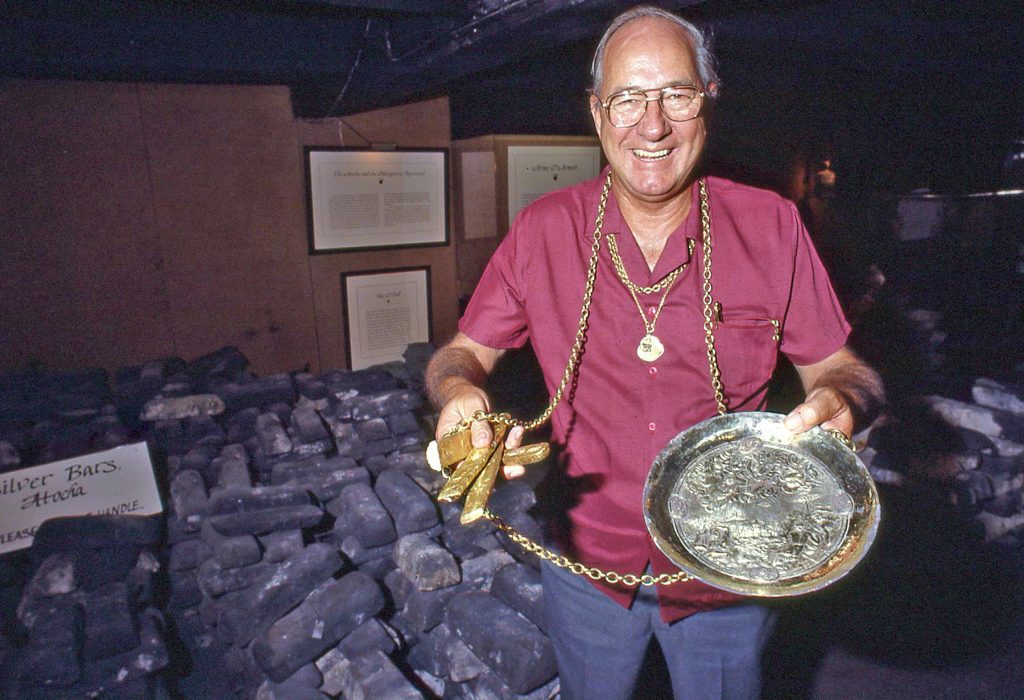It’s a 360-degree argument whether the culture drives television or it’s the other way around. What is not arguable is the amount of searching that takes place on television in its current manifestation. It makes sense that when a culture continues to drift further away from a divinity-centered understanding of being, the society is going to produce a lot of seekers.
Every streaming service known to humanity is filled to the brim with all manner of documentaries and “reality series” where people are searching for answers to an unsolved crime or an unresolved societal scandal. That’s the kind of content we usually find on premium channels. But on the other side of the tracks, the channels we get because our services force them upon us, have a lower bar for facts and a greater emphasis on the sensational.
These lower rent stations are packed with people searching for — but presently not finding — a host of historical and or fanciful treasures that may or may not be hidden somewhere on earth. And no place on earth is safe as they look for lost cities in the Amazon Basin, lost Nazi gold, lost treasures of the Knights Templar, lost ancient aliens, and the list goes on. Now, if only they could produce a show to find my lost car keys.
The shows with the more exotic, or in most cases quixotic, quests like trying to locate some form of buried treasure just show what a great idea Robert Louis Stevenson had with his classic novel “Treasure Island.” It touches some basic human desire. Becoming ridiculously wealthy without working for it is a universal human defect — one thoroughly exploited in these shows.
Whether these shows are pursuing Hitler’s bank account or the Knights Templar’s ATM, the people in them all share a common trait of zealotry. That comes in handy, since many cast members of these shows have alienated the people in their lives due to their tunnel vision — they are convinced that they, and only they, have what it takes to solve some ancient puzzle that has eluded all others. Some have even sacrificed personal relationships and what financial stability they had on dubious quests for what is most likely mythical and historically unproven esoterica.
It’s all Mel Fisher’s fault. Fisher was the man who searched for decades for the Spanish Galleon Nuestra Señora de Atocha. People thought his search was folly, too. Fisher was a zealot with a difference. He relied on sound historical documentation from Imperial Spain and meteorological charts to solidify his unyielding quest. Then, in 1985, Fisher found the Atocha off the Florida coast and its $450 million in treasure.
Besides sounding like a story taken off the pages of a Stevenson novel, Fisher’s tenacity, and refusal to be dissuaded, gave birth to a cottage industry of people convinced their own personal “Atochas” were out there whether in the form of Nazi bullion, Aztec treasure, or the archeological “gold” of unearthing a lost civilization.
These latter-day treasure hunters and would-be Indiana Joneses rely less on hard historical facts and more on speculation and leaps of logic requiring a religious-like devotion and their own absolute faith in — themselves. And they also possess unhealthy doses of belief that they possess special knowledge that is hidden from the rest of us. They seem convinced to the point of ruining their lives that this secret knowledge will lead them to their buried treasure.
It’s a rise of a new kind of Gnosticism that makes sense in a culture where divine revelation is relegated to the status of just somebody’s “truth.”
God is so much simpler.
Yes, Moses was searching in the desert, and yes, the Ark of the Covenant was removed from the Holy of Holies and its location remains a mystery. But the God of Abraham was not a god of riddles like so many homemade deities. This God requires no expertise in divining archaic symbols or the mindset of distant ancestors to discover some great temporal or spiritual riches.
He does demand faith, that mysterious activating element from which, when combined with an open heart and mind, belief springs forth. But unlike the guys on TV with their expeditions into the unknown, and their quest for the glories of man’s past, God waits for us to discover him.
And that is a treasure not hidden away or buried beyond our reach. It is there for the asking, and the X that marks the spot is shaped like a cross.

